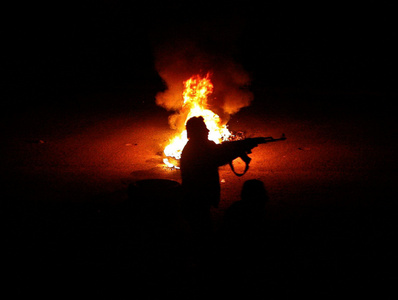Editor’s Note – SUA and many others have been calling for aid to get to the people of Syria, though the small cadre of power continues to use its military might to crush the so-called rebels. In this case however, the ‘rebels’ are the majority, by a wide margin and should be called ‘freedom fighters’. That is what Hillary Clinton and NATO called the uprising rebels in Libya.
In the case of Syria, its more complicated, why? Because Russia and Iran are the key backers of the regime. Obama has called for al Assad to leave, but is applying no pressure to that end. Meanwhile, the majority of Syrian people are feeling the heat – through cruel, heinous, and unconscionable measures used against them, and they need medicine and food – yesterday!
Clashes rage across Syria despite U.N. statement
BEIRUT (AP) — Syrian troops shelled and raided opposition areas and clashed with rebel fighters around the country Thursday despite U.N. efforts to stop the bloodshed so aid could reach suffering civilians.
Activists cited the fresh violence in dismissing a U.N. Security Council statement calling for a cease-fire to allow for dialogue between all sides on a political solution. The government of President Bashar Assad also played down the statement, saying Damascus is under no threats or ultimatums.
Mounting international condemnation of Assad’s regime and high-level diplomacy have failed to ease the year-old Syria conflict, which the U.N. says has killed more than 8,000 people. Activists reported dozens of people killed Thursday including at least 12 government soldiers.
The Syrian uprising began last March with protests calling for political reforms. Unrest spread as Assad’s forces violently tried to quash dissent, and many in the opposition took up arms to defend their towns and attack government troops.
“Civil strife of the sort we are seeing in Syria can destroy whole societies,” U.N. chief Ban Ki-moon told reporters in Malaysia Thursday. Ban reiterated the statement approved by the U.N. Security Council’s 15 members the day before, which sought to send a unified message on the conflict.
The statement endorsed a six-point plan by joint U.N.-Arab League envoy Kofi Annan, which includes a cease-fire by Syrian forces, a daily two-hour halt to fighting to evacuate injured people and provide humanitarian aid and inclusive talks about a political solution.
Western countries have been pushing for Security Council action for months, but Russia and China have twice vetoed stronger resolutions that criticized the regime. Wednesday’s presidential statement becomes part of the council’s permanent record but is not legally binding.
To gain Russian and Chinese support, France watered down the text, removing clauses that could be seen as opening the door for sanctions or military action.
Russia and China have called previous resolutions unbalanced for blaming the conflict solely on the government, and Russian officials worry a strongly worded resolution could allow for military intervention against Assad, as happened in Libya last year.
Russia’s deputy foreign minister said Thursday that Annan will visit Moscow in the coming days. Mikhail Bogdanov also said Russia will receive a delegation from the National Coordination Committee, a Syrian opposition group.
The U.S. and Europe have called on Assad to step down but have said they will not intervene militarily. While Qatar, Saudi Arabia and Libya have spoken positively of arming the rebels, no country is openly doing so.
Syria’s state-run news agency played down the U.N. statement Thursday, saying there are no threats or ultimatums against Damascus. This echoed an earlier statement by Russia.
Activists in Syria dismissed the statement as too late and impossible to implement since Syrian forces have surrounded entire towns and villages and regularly shell civilian areas.
“Is there any way the army will remove its checkpoints for two hours?” said Fadi al-Yassin via satellite phone from the northern province of Idlib. “All of that is empty talk, politics, and we’ve gotten fed up with all of these decisions.”
Many activists say they’ve grown frustrated with what they see as international resistance to act.
Activist groups said Syrian forces were stepping up their assaults on opposition areas around the country Thursday, often sparking clashes with local rebels.
Regime forces shelled the Arbaeen neighborhood in the central city of Hama and clashed with rebels while trying to enter the northern town of Sarmeen.
The Britain-based Syrian Observatory for Human Rights said 10 people, half of them women and children, were killed when troops fired on a bus taking them from the town. Another group, the Local Coordination Committees, said 13 died in the attack on a bus taking the group to a refugee camp in across the border in Turkey. It also reported deaths in government attacks in the central cities of Homs and Hama, putting the nationwide toll at 59.
The Syrian government has barred most media from working in the country and activist claims could not be independently verified.
The Observatory said troops shot dead three civilians in the town of al-Qusair near the border with Lebanon.
Human Rights Watch accused the government of serious abuses against the town’s civilian population in recent weeks, saying its forces had shelled residential neighborhoods, posted snipers of rooftops and attacked residents as they fled.
The New York-based group said Thursday that the town lacks food, water, medical services and suffers a near blackout of its communications.
Reflecting the growing militarization of the conflict, rebels killed at least 12 soldiers in attacks on checkpoints and convoys Thursday, the Observatory said.
Syria’s rebels are outgunned by Assad’s large, professional army but have opted for insurgent attacks on military targets.
The Syrian government cites the rise in such attacks to boost its argument that the uprising is being carried out by terrorist groups acting out a foreign conspiracy.


